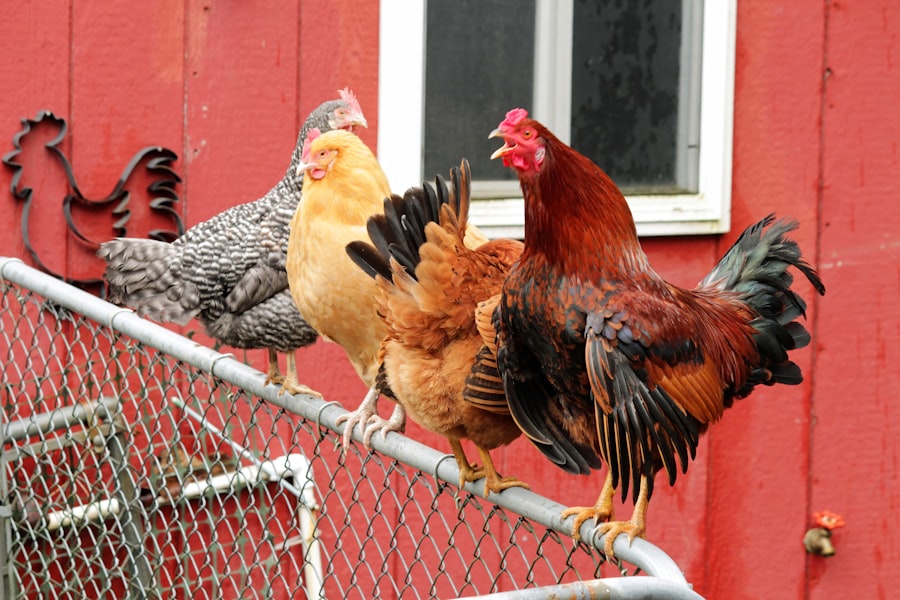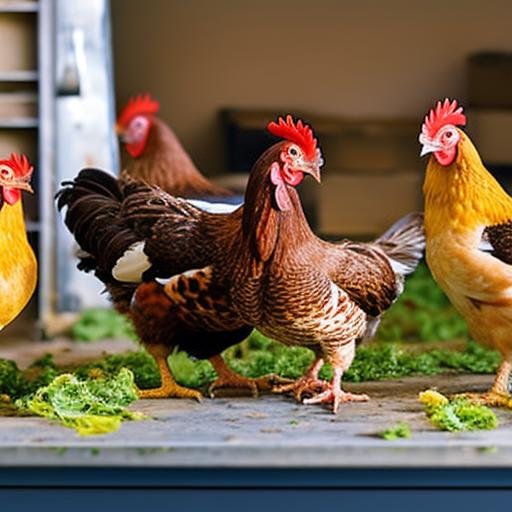Keeping chickens in a garage may seem like an unconventional idea, but it can actually be a practical and rewarding way to raise chickens. There are several benefits to keeping chickens in a garage, such as protection from predators and extreme weather conditions. However, there are also legal considerations that need to be taken into account before embarking on this venture. In this article, we will explore the benefits and legal considerations of keeping chickens in a garage, as well as provide tips on choosing the right chicken breed, designing a chicken coop for your garage, and maintaining a clean and healthy environment for your chickens.
Key Takeaways
- Keeping chickens in a garage can provide fresh eggs and entertainment for the family.
- Legal considerations such as zoning laws and permits should be researched before starting a garage chicken coop.
- Choosing the right breed of chicken for your garage coop depends on factors such as space and climate.
- Designing a chicken coop for your garage requires proper ventilation, lighting, and nesting boxes.
- Maintaining a clean and healthy chicken coop involves regular cleaning, proper feeding, and monitoring for signs of illness.
Benefits of keeping chickens in a garage
One of the main benefits of keeping chickens in a garage is the protection it provides from predators. Chickens are vulnerable to attacks from predators such as raccoons, foxes, and even neighborhood dogs. By keeping them in a secure garage, you can greatly reduce the risk of these attacks and ensure the safety of your flock.
Another benefit is protection from extreme weather conditions. Chickens are sensitive to temperature fluctuations and can suffer from heat stress or frostbite if exposed to extreme temperatures. By keeping them in a garage, you can provide them with a controlled environment that is insulated and protected from the elements.
Additionally, keeping chickens in a garage can also help reduce noise and odor. Chickens can be noisy creatures, especially when they are laying eggs or feeling threatened. By keeping them in a garage, you can minimize the noise disturbance to your neighbors. Similarly, proper ventilation and cleaning can help control odor, making it more pleasant for both you and your neighbors.
Legal considerations
Before setting up a chicken coop in your garage, it is important to familiarize yourself with the legal considerations involved. Zoning laws vary from place to place, so it is essential to check with your local government or municipality to determine if keeping chickens in a garage is allowed in your area. Some areas may have restrictions on the number of chickens you can keep or the size of the coop.
In addition to zoning laws, you may also need to obtain permits or licenses to keep chickens in a garage. These permits are typically required to ensure that the coop meets certain health and safety standards. It is important to research and comply with these regulations to avoid any legal issues down the line.
Choosing the right chicken breed
When it comes to keeping chickens in a garage, not all breeds are suitable for this environment. Some breeds are better suited for free-ranging or outdoor living, while others are more adaptable to confined spaces. It is important to choose a breed that is known for its ability to thrive in a garage setting.
Bantam breeds, such as Silkies or Polish, are often recommended for garage living. These smaller breeds are known for their adaptability and can do well in smaller spaces. They are also generally quieter and less likely to cause disturbances.
Another consideration when choosing a breed is egg production. If you are primarily interested in raising chickens for their eggs, you may want to choose a breed that is known for its high egg production, such as Leghorns or Rhode Island Reds.
Designing a chicken coop for your garage
Designing a chicken coop for your garage requires careful planning to ensure that it meets the needs of your flock and fits within the available space. The size of your coop will depend on the number of chickens you plan to keep, as well as any legal restrictions in your area.
It is important to provide enough space for each chicken to move around comfortably. A general rule of thumb is to allow at least 4 square feet of space per chicken inside the coop, and 10 square feet per chicken in an outdoor run if possible. The coop should also include roosting bars for the chickens to perch on at night, as well as nesting boxes for them to lay their eggs.
Proper ventilation is also crucial to maintain a healthy environment for your chickens. This can be achieved by installing windows or vents in the coop to allow for air circulation. It is important to strike a balance between providing enough ventilation to prevent the buildup of ammonia and other harmful gases, while also protecting the chickens from drafts.
Materials needed for a garage chicken coop

Building a chicken coop in your garage will require a variety of materials. Some of the basic materials you will need include:
– Wood: for framing and building the structure of the coop
– Wire mesh: for covering windows and vents to keep out predators
– Nails, screws, and other hardware: for assembling the coop
– Insulation: to provide temperature control and protect against extreme weather conditions
– Flooring material: such as straw or wood shavings for bedding
– Nesting boxes: for the chickens to lay their eggs
– Roosting bars: for the chickens to perch on at night
It is important to choose materials that are safe and non-toxic for your chickens. Avoid using treated wood or materials that may contain harmful chemicals.
Step-by-step guide to building a chicken coop in your garage
Building a chicken coop in your garage can be a fun and rewarding DIY project. Here is a step-by-step guide to help you get started:
1. Measure your available space: Determine the size of your coop based on the number of chickens you plan to keep and the available space in your garage.
2. Design your coop: Sketch out a design for your coop, taking into consideration the necessary features such as nesting boxes, roosting bars, and ventilation.
3. Gather materials: Purchase all the necessary materials based on your design.
4. Build the frame: Start by building the frame of the coop using wood and screws or nails. Make sure it is sturdy and secure.
5. Install windows and vents: Cut out openings for windows and vents, and cover them with wire mesh to keep out predators.
6. Insulate the coop: Install insulation to provide temperature control and protect against extreme weather conditions.
7. Add nesting boxes and roosting bars: Install nesting boxes and roosting bars according to your design.
8. Add bedding material: Fill the coop with bedding material such as straw or wood shavings.
9. Install a feeder and waterer: Provide a feeder and waterer for your chickens to ensure they have access to food and water at all times.
10. Secure the coop: Make sure the coop is secure and predator-proof by checking for any gaps or openings that could allow predators to enter.
Tips for maintaining a clean and healthy chicken coop
Keeping a clean and healthy chicken coop is essential for the well-being of your flock. Here are some tips to help you maintain a clean and healthy environment:
1. Regularly clean the coop: Remove soiled bedding, droppings, and any other debris from the coop on a regular basis. This will help prevent the buildup of harmful bacteria and parasites.
2. Provide fresh bedding: Replace the bedding material regularly to keep it clean and dry. This will help prevent odors and reduce the risk of disease.
3. Keep the coop dry: Ensure that the coop is well-ventilated to prevent moisture buildup, which can lead to mold, mildew, and respiratory issues for your chickens.
4. Practice good biosecurity: Limit access to your coop to prevent the introduction of diseases or parasites. Clean your shoes and wash your hands before entering the coop, especially if you have been in contact with other chickens or poultry.
5. Monitor for signs of illness: Regularly check your chickens for any signs of illness or distress, such as changes in behavior, loss of appetite, or abnormal droppings. Seek veterinary care if necessary.
Feeding and caring for your garage chickens
Feeding and caring for your garage chickens is similar to caring for chickens in any other environment. Provide them with a balanced diet that includes a mix of commercial chicken feed, fresh fruits and vegetables, and access to clean water at all times.
It is also important to provide your chickens with opportunities for exercise and mental stimulation. This can be achieved by allowing them to free-range in a safe outdoor area or by providing them with toys and enrichment activities inside the coop.
Regularly check your chickens for any signs of illness or injury, and seek veterinary care if necessary. Keep an eye out for pests such as mites or lice, and take appropriate measures to control them.
Is keeping chickens in a garage right for you?
Keeping chickens in a garage can be a practical and rewarding way to raise chickens, especially if you have limited outdoor space or live in an area with strict zoning laws. The benefits of keeping chickens in a garage include protection from predators and extreme weather conditions, as well as reduced noise and odor.
However, it is important to consider the legal considerations involved, such as zoning laws and permits. Additionally, choosing the right chicken breed, designing a suitable coop, and maintaining a clean and healthy environment are all crucial factors to consider.
Ultimately, whether keeping chickens in a garage is right for you will depend on your specific circumstances and preferences. It is important to carefully weigh the benefits and considerations before making a decision.
If you’re wondering if you can keep chickens in your garage, you might be interested in this informative article on converting a shed into a chicken coop. Poultry Wizard provides step-by-step instructions and helpful tips on how to transform your shed into a comfortable and safe space for your feathered friends. Check out their article here to learn more about creating the perfect chicken coop in your garage.
FAQs
Can I keep chickens in my garage?
Yes, you can keep chickens in your garage, but there are certain things you need to consider before doing so.
What are the things I need to consider before keeping chickens in my garage?
You need to make sure that your garage is well-ventilated, has enough space for the chickens to move around, and is free from any hazardous materials that may harm the chickens.
What kind of ventilation do I need for my garage?
You need to have proper ventilation in your garage to ensure that the chickens have fresh air to breathe. You can install windows or vents to allow air to circulate.
How much space do I need for my chickens in my garage?
You need to provide at least 4 square feet of space per chicken in your garage. This will ensure that they have enough room to move around and exercise.
What kind of materials should I use for the flooring of my garage?
You should use materials that are easy to clean and disinfect, such as concrete or vinyl flooring. Avoid using materials that can absorb moisture, such as wood or carpet.
What kind of food and water do I need to provide for my chickens?
You need to provide your chickens with fresh water and a balanced diet that includes grains, vegetables, and protein. You can purchase chicken feed from your local pet store or farm supply store.
Do I need to provide my chickens with a nesting box?
Yes, you need to provide your chickens with a nesting box where they can lay their eggs. You can purchase nesting boxes from your local pet store or farm supply store.
Do I need to clean my garage regularly if I keep chickens in it?
Yes, you need to clean your garage regularly to ensure that it is free from any hazardous materials that may harm the chickens. You should also clean the chicken coop and nesting boxes regularly to prevent the buildup of bacteria and parasites.
Meet Walter, the feathered-friend fanatic of Florida! Nestled in the sunshine state, Walter struts through life with his feathered companions, clucking his way to happiness. With a coop that’s fancier than a five-star hotel, he’s the Don Juan of the chicken world. When he’s not teaching his hens to do the cha-cha, you’ll find him in a heated debate with his prized rooster, Sir Clucks-a-Lot. Walter’s poultry passion is no yolk; he’s the sunny-side-up guy you never knew you needed in your flock of friends!







